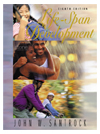 |  Life-Span Development, 8/e John W. Santrock,
University of Texas - Dallas
Early Childhood Socioemotional Development in Early Childhood
Chapter ObjectivesI.Discuss young children's self-understanding, incorporating Erikson's view of the initiative versus guilt stage. |
 |  |  | II.Explain how children attempt to make sense of their own and other people's emotional reactions and feelings. |
 |  |  | III.Understand the Piagetian, social cognitive, and Freudian theories of moral development. |
 |  |  | IV.Describe the biological, social, and cognitive factors that influence gender development. |
 |  |  | V.Understand the four major parenting styles and how parenting styles are affected by developmental changes in the child, as well as by culture, social class, and ethnicity. |
 |  |  | VI.Describe the multifaceted nature of child abuse, including contextual aspects, risk factors, and consequences of abuse. |
 |  |  | VII.Describe the complexity of sibling relationships. |
 |  |  | VIII.Summarize the research that has examined birth-order effects and the criticism that birth order has been overdramatized and overemphasized. |
 |  |  | IX.Consider how families are changing in a changing society, including concerns of working mothers or both parents working. |
 |  |  | X.Discuss the many factors involved in divorce such as the effects of divorce on children, whether parents should stay together for the sake of their children, the influence of family processes, factors involved in children's risk and vulnerability, and socioeconomic factors. |
 |  |  | XI.Outline the cultural, ethnic, and socioeconomic variations in families. |
 |  |  | XII.Indicate the role that peers play in early development and be able to differentiate peer interaction and parent-child interaction. |
 |  |  | XIII.Describe the functions of play and the types of play. |
 |  |  | XIV.Describe the effects of television viewing on development, including both positive and negative behavior. |
|



 2002 McGraw-Hill Higher Education
2002 McGraw-Hill Higher Education